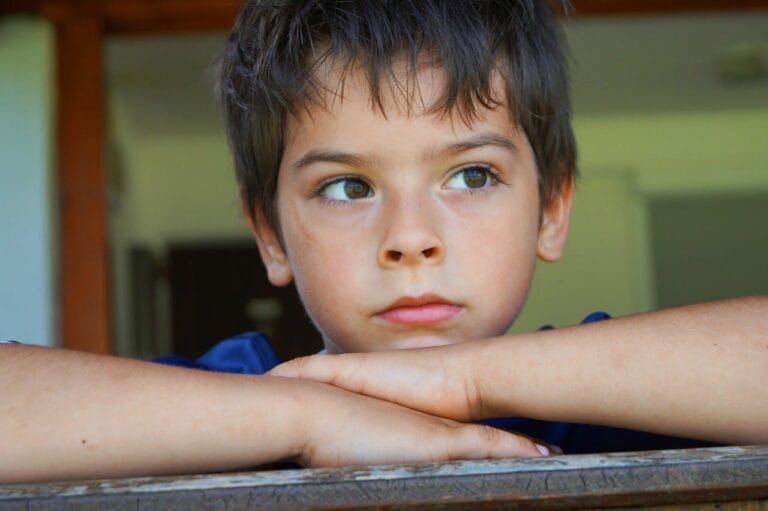
The Challenge of a Grieving Child
People continue to die at an alarming rate and families are suffering all around us. And many others are grieving the loss of their jobs and businesses, freedoms, and are experiencing a forgotten sense of normalcy. People across the country have lost their sense of security and feeling connected.
While they may not express it, children are feeling all of this. And children have their losses as well, such as grieving the loss of childhood rites of passage — school ceremonies and events, organized sports, sleepovers, and just hanging out and “chilling” with their friends. These losses are taking a toll.
And for some children, the loss is more painful and permanent– they are grieving the loss of a loved one as well. Whether it is the loss of a parent, sibling, grandparent, friend, or even a beloved family pet, the grieving process can be both difficult and confusing.
Children grieve differently than adults. Young children may not even understand what death means. The notion that people who have died won’t be coming back is beyond their grasp. Or they may worry that they are somehow to blame for the death. Alternatively, they may not express much concern about the event, or be able to seamlessly transition from crying one minute to playing in the next.
Knowing how to support and help a child during this difficult time can be a formidable challenge. While you can’t protect children from loss and its attendant pain, you can be instrumental in helping them feel secure and cope in the healthiest way possible.
It is the hope that this brief but comprehensive guide will provide answers to many of the questions that parents and educators will face when confronting this delicate and critical undertaking.
Explaining Death to a Child
When informing a child of death, it is best to begin by sharing the minimum amount of information and then add to that in response to the questions that are asked. The safest approach is to keep explanations short, simple, and more direct, providing this can be done both calmly and compassionately.
“Graphic details should be omitted. The goal is to provide an age-appropriate understanding of what happened so that children can begin to come to terms with the finality and consequences of the death,” says Dr. Eric Lewandowski, Ph.D., Clinical Assistant Professor in the Department of Child and Adolescent Psychiatry at NYU Langone and member of its Child Study Center.
Young children may need to have the meaning of death explained to them. “There are no right words, but it’s important to convey that it is a permanent state and that people can’t come back from it,” Dr. Lewandowski says. “Also, it’s important to use the words death or died, rather than other language like ‘passed away’ as this may leave room for confusion about what has happened.”
“The specific words you use don’t really matter, it’s the message that counts,” Dr. Lewandowski says. “Parents should check in intermittently so that kids understand that they can talk at any time about anything that is upsetting them about the death, but they should not be forced to talk about their grief or the person who died if they don’t want to.”
The objective is to encourage children to express their feelings. While well-meaning, it can be harmful to “protect” or “shelter” children by hiding your own sadness. Children are very intuitive and will invariably sense that something is wrong, but will be left feeling confused and alone.
Another problem incurred by hiding your own grief is that it may cause children to feel like the sadness they may be feeling is bad. At the same time, shield children from your most emotional moments, as seeing these may cause the child to worry about you or feel insecure.
Empathetic Listening
While empathetic listening is always helpful, for children it is a necessity. Because children often feel misunderstood and don’t have the same reservoirs of experience or language to express themselves, without a truly empathetic ear they will suffer.
At the same time, this empathy may be very challenging to provide to them. When children share their worries with adults, adults have a natural tendency to do a lot of talking, assuming that sharing their wisdom and experience will somehow make things better.
While this approach is questionable at any time, when it comes to processing grief, empathetic listening is far more helpful and productive. In these painful moments, children are not looking primarily for solutions or answers, but rather a welcoming environment where they feel comfortable sharing their feelings.
Central to empathetic listening is putting yourself, to the degree possible, into the speaker’s position to understand their point of view. When the child stops talking, it is essential to validate the child’s feelings with phrases such as, “It sounds like you are having a really hard time, I know this has been a lot to handle.” And follow up that validation with encouragement to keep sharing.
On the other hand, avoid telling the child, “I know how you feel.” Everyone’s inner experience is unique. Sending the child the message, even unintentionally, that your feelings are exactly the same may cause the child to feel pressured to deal with those feelings the same way that you do, while at the same time set the child up for disappointing you if unable to live up to that.
Helping a Child Manage Feelings
Death invariably triggers many feelings: sadness, longing, fear, and anger. “As painful an experience as it is, it can be helpful to remember that death of a loved one is a universal experience that everyone faces at one time or another, and it is an experience that we are equipped to manage,” Dr. Lewandowski says. “It may be reassuring for parents to know that the process of grieving usually happens on its own.”
For most children, all that is needed is the support of loved ones, Dr. Lewandowski adds. “Every child, and person, may differ specifically in what they feel in response to a death,” he says. “There is no one right or normal way that your child is meant to experience their grief, and there is no one right way for you to offer support.”
The experience of sadness and longing at the death of a loved one, while painful, is, in fact, essential for coping. “As much as we want to protect our kids from this pain, it’s really impossible to do and isn’t even advisable—experiencing these emotions is one of the most important things that children, and all of us, need to do when a loved one dies,” Dr. Lewandowski says.
“What is most needed is to meet your child in whatever they are feeling, to provide a chance to talk about the person who died and their feelings about the death, and to validate and normalize their experience.”
While sadness and longing are relatively easy to validate, other emotions, such as anger, including at the person who died or at the child’s parents, can be far more of a challenge to validate but are no less vital.
“These feelings are part of a normal grief response, and parents should strive to be accepting of them,” Dr. Lewandowski says. “Usually, these feelings evolve over time and become less distressing as kids begin to re-engage in other aspects of life.”
Helping a Child Move Forward
After experiencing the death of a loved one, all the more so if it was related to the COVID-19 pandemic, children may become very concerned about the implications for themselves or others in the family. They may wonder, “Who’s next?” It is crucial for parents to provide reassurance regarding the precautions that have been undertaken to keep everyone safe.
For the vast majority of children, and adults as well, coming to terms with the death and resuming a life that includes joy and satisfaction is to be expected. “Parents should keep family routines as intact as possible, and also make sure to plan opportunities for fun or other positive experiences, either together as a family, or for their child with peers,” Dr. Lewandowski says.
Essential to reintegrating into a “normal life” again are positive experiences, fun, and enjoyment. They are critical in supporting a child’s adjustment to a family death and should be encouraged. Children need to know that life will continue and that it is alright to be able to have fun and to laugh. “The COVID-19 crisis presents new obstacles in this process, but the activities and opportunities for fun need not be extraordinary. Keep in mind that youth, especially younger kids, may spend more time engaged in play rather than overt grieving. A helpful rule of thumb is that kids who appear to be coping well are likely coping well,” Dr. Lewandowski says.
How to Know When to Call for Help
Since the death of a loved one is a profoundly painful experience, immediately after the tragedy, it can be difficult to make the distinction between what is within the bounds of normal and what may need to be referred to a mental health professional.
Most of the time, grieving adults and children are capable of coping with the loving support of family and friends and won’t require the intervention of professional support.
And yet, symptoms that persist beyond six months may indicate that your child needs professional help to overcome his/her grief. These are some of the signs:
- Nightmares
- The belief that the world is generally unsafe
- Irritability, anger, and moodiness
- Difficulty concentrating
- Disturbances regarding appetite or sleep
- Chronic behavior problems
- Regression to earlier behavior in young children, such as clinging, bedwetting, or thumb-sucking that persists
- Withdrawing or detachment from others
- Substance abuse (particularly in teens)
- Refusal to attend school or play with friends
- Anxiety or depression
- Ongoing depression
- Suicidal ideation
Don’t Forget about Your Child’s Parent
While a parent’s initial impulse is to comfort and protect the child, it is crucial to seek help for your grief. Research shows us that there is a strong linkage between how well the adult is doing and how the child fares. This doesn’t mean hiding your grief from your child. Rather, it means that, as the parent, you must ensure that you have people and activities in your life that provide comfort.
Accessing support is modeling for your children how to take care of themselves, and it reassures them that you have the presence and energy to take care of them. It is important to accept help from friends, relatives, and mental health professionals as needed.
Let’s face it. For children, this pandemic will profoundly impact how they see the world, perhaps for the rest of their lives. The more we can do to help children learn how to handle difficult emotions in a healthy way, the more we can do to ensure their futures.




